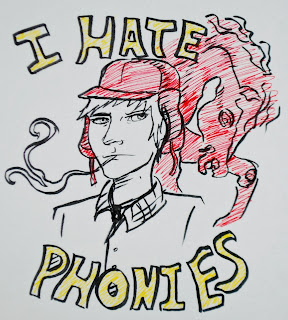The Catcher in the Rye
Sunday, May 6, 2012
The Catcher in the Rye
The Catcher in the Rye is a novel written in 1951 by J.D. Salinger. The protagonist of this story is Holden Caulfield, a very conflicted and complex individual. The novel follows Holden's account of his happenings from being kicked out of Pency Prep through his journey in New York City. Several of the main themes and motifs include the perpetuation of childhood innocence, assimilation into society, and confusion.
Phoebe's Record
Holden bought Phoebe, his little sister, a record while he was in New York. The record was "Little Shirley Beans," which is a record intended for children. This is an example of how Holden wanted to make sure that Phoebe's innocence was maintained and she was not made an adult too soon. However, he dropped it and the record shattered. This is symbolic of the shattering of innocence, a recurrent motif. When Phoebe found out that he was going to give her a record she still wanted it and asked him to give her the pieces. This was a very symbolic gesture as Holden's mental ability appears to be "shattering" and Phoebe is there to "pick up the pieces." Throughout the novel it was suggested that Phoebe was Holden's favorite person. This can be seen by his constant desire to call her on the phone and tell her about his current predicament. With this record and the resulting circumstances, Phoebe appears as Holden's guardian, another recurring idea in the novel.
Allie's Glove
Allie was Holden's younger brother who died of Leukemia. Holden still has Allie's old baseball glove and cherishes it deeply. He holds on to this glove to help himself remember the kind of person his brother was, which was innocent. Also, it represents Holden's emotions. This is due to the fact that he hides the glove just like he does his emotions. One of the very few things Holden enjoys in life is the memories of his brother and this is realized through the reader's observance of his obsession with the glove. On the glove are poems that Allie had written so that he would have something to read while standing in the outfield during a baseball game. Holden still has a deep love for Allie. This can be seen by the constant regret of his not letting Allie come and play with him all the time. This glove is a symbol of Holden's continued attachment to his childhood and his relationship with his brother that is getting harder to hold on to, which is a main theme in the novel.
"The Other Side"
 It is a well-known fact that Holden is an outcast. It is seen several times throughout the novel where he deems himself different from others, and sometimes even as superior, such as when he refers to phonies. Holden makes a reference to being from "the other side." He claims that he feels trapped on this side and unable to assimilate into the real world, the rest of society. An example of his failure to assimilate can be seen in his actions that led to his expulsion from many schools, such as Pency Prep. He was unable to conform to the specific needs of the teachers and this led him to fail in everything except English. This "other side" seems to keep him separate from others and leave him unable to truly associate and make friends. This fact keeps him further entrenched in his reoccurring state of depression and cynical behavior, a major motif.
It is a well-known fact that Holden is an outcast. It is seen several times throughout the novel where he deems himself different from others, and sometimes even as superior, such as when he refers to phonies. Holden makes a reference to being from "the other side." He claims that he feels trapped on this side and unable to assimilate into the real world, the rest of society. An example of his failure to assimilate can be seen in his actions that led to his expulsion from many schools, such as Pency Prep. He was unable to conform to the specific needs of the teachers and this led him to fail in everything except English. This "other side" seems to keep him separate from others and leave him unable to truly associate and make friends. This fact keeps him further entrenched in his reoccurring state of depression and cynical behavior, a major motif.
Suitcases
 A prevalent occurrence in The Catcher in the Rye is the issue of prejudices. This is not referring to prejudices based on race, it is referring to prejudices based on more mundane things. Holden talks about several prejudices that seem to be naturally rooted in humans. Holden is actually guilty of acting on some prejudices, such as when referring to someone as a "phony" before he has even had the chance to meet them. He talks in detail about the issue of suitcases. Holden recalls a time at school when his roommate, Dick Slagle, would hide his suitcases since they weren't as fancy and would actually make Holden keep his out so as to convince people that Holden's suitcases were actually his. Henceforth, Holden associated nice suitcases with being in a higher societal class. After he originally talks about the suitcase ordeal, he encounters two nuns. These nuns possessed "very inexpensive looking suitcases" and this led Holden to judge them. He eventually felt guilty after doing so due to the fact that he got to know them by talking to them and realized that they were nice people. The issue of the suitcases is an ideal example of the issue of prejudices in this novel. These prejudices contribute to Holden's opinions of others and cause him to abhor meeting new people.
A prevalent occurrence in The Catcher in the Rye is the issue of prejudices. This is not referring to prejudices based on race, it is referring to prejudices based on more mundane things. Holden talks about several prejudices that seem to be naturally rooted in humans. Holden is actually guilty of acting on some prejudices, such as when referring to someone as a "phony" before he has even had the chance to meet them. He talks in detail about the issue of suitcases. Holden recalls a time at school when his roommate, Dick Slagle, would hide his suitcases since they weren't as fancy and would actually make Holden keep his out so as to convince people that Holden's suitcases were actually his. Henceforth, Holden associated nice suitcases with being in a higher societal class. After he originally talks about the suitcase ordeal, he encounters two nuns. These nuns possessed "very inexpensive looking suitcases" and this led Holden to judge them. He eventually felt guilty after doing so due to the fact that he got to know them by talking to them and realized that they were nice people. The issue of the suitcases is an ideal example of the issue of prejudices in this novel. These prejudices contribute to Holden's opinions of others and cause him to abhor meeting new people.Phonies
One of the most notable aspects of Catcher in the Rye is Holden's use of the word phony. He refers to various people as phonies, such as the people that he went to school with. When Holden is referencing a phony, he is referring to someone who acts and speaks disingenuously. One of the words that epitomizes his hate for phonies is grand. "Grand. There's a word I really hate. It's phony. I could puke every time I hear it." Holden defines a phony as someone who acts solely to look good rather than to help anyone else or do anything honest. An example of someone who is a phony is Mr. Ossenburger. He runs a discount funeral parlor that takes advantage of grieving families. Holden's use of the word phony reiterates his cynical attitude towards society, a recurring theme. By the end of the novel, however, Holden's criticism of phonies has died down as he turns his attention to saving the innocence of youth.
Lying
One of the many things that Holden hates about society is phoniness. One of the key elements of being phony is blatantly lying and deceiving. However, Holden is guilty of this very crime. An example of this is when he is on the bus going into New York city, after he has left Pency, and runs into the mother of another boy that goes there. He lies to her saying several good things about her boy while he is secretly thinking about how much he dislikes the boy. He also lies to her about the reason that he has left Pency before the beginning of break by telling her he is having an operation on a brain tumor, a very extravagant lie. Holden lies for various reason. Depending on the situation, it can be for his own amusement or to keep others out of his business. Also, it appears that he lies regularly because he cannot and refuses to accept the truth, a prevalent motif in the novel.
Subscribe to:
Comments (Atom)




